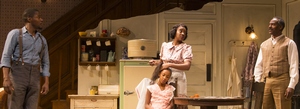SITE GUIDE
SEARCH
REVIEWS OF ALL CURRENTLY RUNNING NY SHOWS
REVIEW ARCHIVES
ADVERTISING AT CURTAINUP
FEATURES
NEWS
Etcetera
Broadway
Off-Broadway
BOOKS and CDs
OTHER PLACES
See links at top of our Main PageQUOTES
TKTS
PLAYWRIGHTS' ALBUMS
LETTERS TO EDITOR
FILM & TV
LINKS
MISCELLANEOUS
Free Updates
Masthead
A CurtainUp New Jersey Review
The Piano Lesson
|
Berniece talking about what she seen. She say Sutter's ghost standing at the top of the stairs. She ain't just make all that up. — Doaker She up there dreaming. She ain't seen no ghost. — Boy Willie |

L to R: Stephen Tyrone Williams, Frances Brown, Miriam A. Hyman John Earl Jelks (Photo credit: T. Charles Erickson)
|
For starters there is the spectacular impressionistic setting by Neil Patel in which the atmospherically lighted homes of Pittsburgh's Hill District loom and are contrasted against the realism of the interior of the home. The main thrust of the action centers on an estranged brother and sister, the grandchildren of slaves.
Attesting to a rich family history are the faces of railroad employee Doaker's (John Earl Jelks) grandparents sculptured on the piano, the most prized family possession. The play's central conflict arises when Doaker's widowed niece Berniece (Miriam A. Hyman) refuses to even consider selling the virtually un-played piano so that her brother Boy Willie (Stephen Tyrone Williams) can buy land on the property once owned by their family's slave-master.
Carved out of sorrow by the great-grandfather whose wife and child were sold to another master in exchange for the piano, the piano has become a family symbol, forever rooted in the memories of separation, pain and even death. Accompanied by his fugitive friend Lyman (David Pegram), Boy Willie has arrived from the South with a truckload of ripe watermelons to sell, and a dream of finally buying his own farm with the accumulated proceeds that he hopes will include money from the sale of the piano.
Both family friends and others, including Berniece's 11 year-old daughter Maretha (Frances Brown), Wining Boy (Cleavant Derricks) Doaker's Sportin' Life-like brother, and Boy Willy and even Lymon's trollop-for-a-night Grace (Shannon Janee Antalan), get a good tossing about thanks to Wilson's intriguing, ghost-embedded plot. Carroll's unfussy but meticulously nuanced direction brings a rewarding credibility to the variously weird, romantic, whimsical and ferocious elements in the play, but always sticking to its course. There are also just enough bluesy musical interludes and fine background sound and scoring (the latter credited to Bill Kirby and Baikida Carroll respectively) to off-set the play's tendency toward narrative excess and its two-hour forty minute length.
The rather hokey but wonderfully theatrical exorcism resolution gives lighting designer Edward Pierce a chance to shine as well as prompt a few shivers from us and even more particularly from the characters whose lives once torn apart are now braced for a cataclysmic renewal. Boy Willie may be a little more than a hurly-burly bag of winds, but Williams makes us see him as sadly heroic. Pegram's performance as Lymon is notably endearing for its lack of sophistication, especially in the light of his misplaced romantic gestures toward the vulnerable Berniece.
Jelks is terrific as Doaker, the family's stabilizing force. Hyman, a 2012 graduate of the Yale School of Drama is a revelation as Berniece, a juicy role that has already been played superbly by others. How refreshing it is to see Berniece's haunted heart re-authenticated with so much verve. There are also fine performances by Owiso Odera, as Berniece's preacher-suitor and by fifth-grader Brown as Berniece's daughter. Also stand-out is Derricks as the hustling piano-playing Wining Boy.
Within the canon of Wilson's plays that cover the African-American experience in the 20th century, and particularly those in which the natural world is invaded by the supernatural, the characters of The Piano Lesson (the 4th play in the cycle) perhaps strike the clearest and brightest notes. And director Carroll has gotten her fine company to play them all memorably.
For more about August Wilson check out Curtainup's Wilson Backgrounder
|
The Piano Lesson By August Wilson Directed by Jade King Carroll Cast: John Earl Jakes (Doaker), Steven Tyrone Williams (Boy Willie), David Pegram (Lymon), Miriam A. Hyman (Berniece), Frances Brown (Maretha), Owiso Odera (Avery), Clevant Derricks (Wining Boy), Shannon Janee Antalan (Grace). Scenic Design: Neil Patel Costume Design: Paul Tazewell Lighting Design: Edward Pierce Sound Design: Bill Kirby Composer: Baikida Carroll Running Time: 2 hours 40 minutes including intermission McCarter Theatre Center, 91 University Place, Princeton, N.J. Ticket Range: $25.00 - $94.50 Dates/Times:Tuesdays, Wednesdays and Thursdays at 7:30 p.m.; Fridays at 8:00 p.m., Saturdays at 3:00 p.m. and 8:00 p.m., Sundays at 2:00 p.m. and 7:30 p.m. From 01/08/16 Opened 01/15/16 Ends 02/07/16 Review by Simon Saltzman based on performance 01/15/16 |
|
REVIEW FEEDBACK Highlight one of the responses below and click "copy" or"CTRL+C"
Paste the highlighted text into the subject line (CTRL+ V): Feel free to add detailed comments in the body of the email. . .also the names and emails of any friends to whom you'd like us to forward a copy of this review. For a feed to reviews and features as they are posted add http://curtainupnewlinks.blogspot.com to your reader Curtainup at Facebook . . . Curtainup at Twitter Subscribe to our FREE email updates: E-mail: esommer@curtainup.comesommer@curtainup.com put SUBSCRIBE CURTAINUP EMAIL UPDATE in the subject line and your full name and email address in the body of the message. If you can spare a minute, tell us how you came to CurtainUp and from what part of the country. |


 Fun Home -CD
Fun Home -CD The King and I -CD
The King and I -CD American in Paris -CD
American in Paris -CD